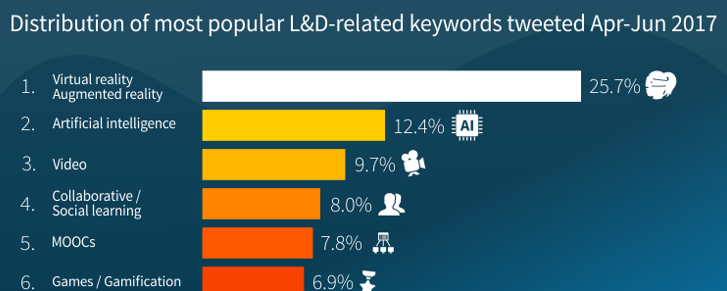Survey and Infographic: L&D Trends on Twitter in 2017/Q2

When we started our L&D Twitter research by the end of 2016, we soon realised that simply counting tweets over a certain period would not be enough. To gain insight into the L&D sentiment, we decided to monitor Twitter on a monthly basis (and publish results quarterly).
We’re all human, and sometimes it’s impossible to avoid the hype. With the imminent arrival of the 10th iPhone we see the Twittersphere increasingly pumped up with prospects of AR to the consumer world. Does it affect our sentiment when assessing the technology for workplace learning?
Presenting the 2017/Q2 L&D Twitter Trends Update

Contrary to many expectations, the growth of both VR/AR and AI ended almost at the exact same time. While previous reports suggested that the AI curve will follow VR and eventually take its throne, we can now assume that the movement of both curves is more or less synced. While VR/AR virtually exploded 6 months ago, deep learning and other notable AI advances haven’t caught the L&D imagination in the same way.
It seems clear that both VR/AR and AI are legit trends, which will remain a point of L&D debate in the foreseeable future. More importantly, there are no new technologies on the horizon that could successfully replace the current leaders.
Lack of new promising technologies could also mean that the next big thing in L&D will not be about tech. Google recently surprised many with its revelation that a lot of its core focus in management tools is on very basic stuff: how to run meetings, have conversations and set goals (source).
Focusing on what is out there, we see a clear case from splitting VR and AR. Both hold a firm grasp on our imagination, and practical advancements are starting to emerge on both ends. While VR is clearly ahead, thanks to opportunities in gaming and entertainment, AR is starting to see some practical implementations too.
Google Glass, a project believed to be deceased, popped up with some promising implementations in the logistics and warehousing sectors.
AI is following their lead (which also matches its position on the latest Gartner’s hype cycle). When significant practical applications emerge in workplace L&D, there might be a case to split AI into different areas as well (machine learning, deep learning, neural networks, etc.).
But for now, it would be good if we started looking into virtual reality and augmented reality as two distinct disciplines. VR will likely remain number 1 in Q3, but AR shouldn’t be far behind.
Here’s a list of overall results in 2017/Q2:
| Keyword | Results |
|---|---|
| Virtual / Augmented reality | 25.76% |
| Artificial intelligence | 12.41% |
| Video | 9.76% |
| Collaborative / Social learning | 8.05% |
| MOOCs | 7.89% |
| Games / Gamification | 6.96% |
| Synchronous delivery / Webinars | 6.18% |
| Micro learning | 5.92% |
| Neuroscience / Cognitive science | 4.49% |
| Curation | 3.79% |
| Personalization, adaprive delivery | 2.86% |
| Consulting more deeply with the business | 2.21% |
| Mobile delivery | 2.20% |
| Knowledge management | 1.13% |
| Wearable tect | 0.26% |
| Personal knowledge mastery | 0.14% |
Data sources
For the purpose of our survey we analysed tweets by the following influential Twitter profiles:
- Donald H. Taylor (@DonaldHTaylor): 10,635 followers
- David Kelly (@LnDDave): 12,903 followers
- Towards Maturity (@TowardsMaturity): 5,631 followers
- Fosway (@fosway): 1,699 followers
In total we analysed 24,301 Twitter unique profiles (as some may be following two or more influencers). Total tweets analysed: around 2,8M.
For our methodology and the full 2016 report please visit L&D trends on Twitter in 2016.
The results for Q3 are coming in October 2017. Stay tuned for quarterly updates of this research:

